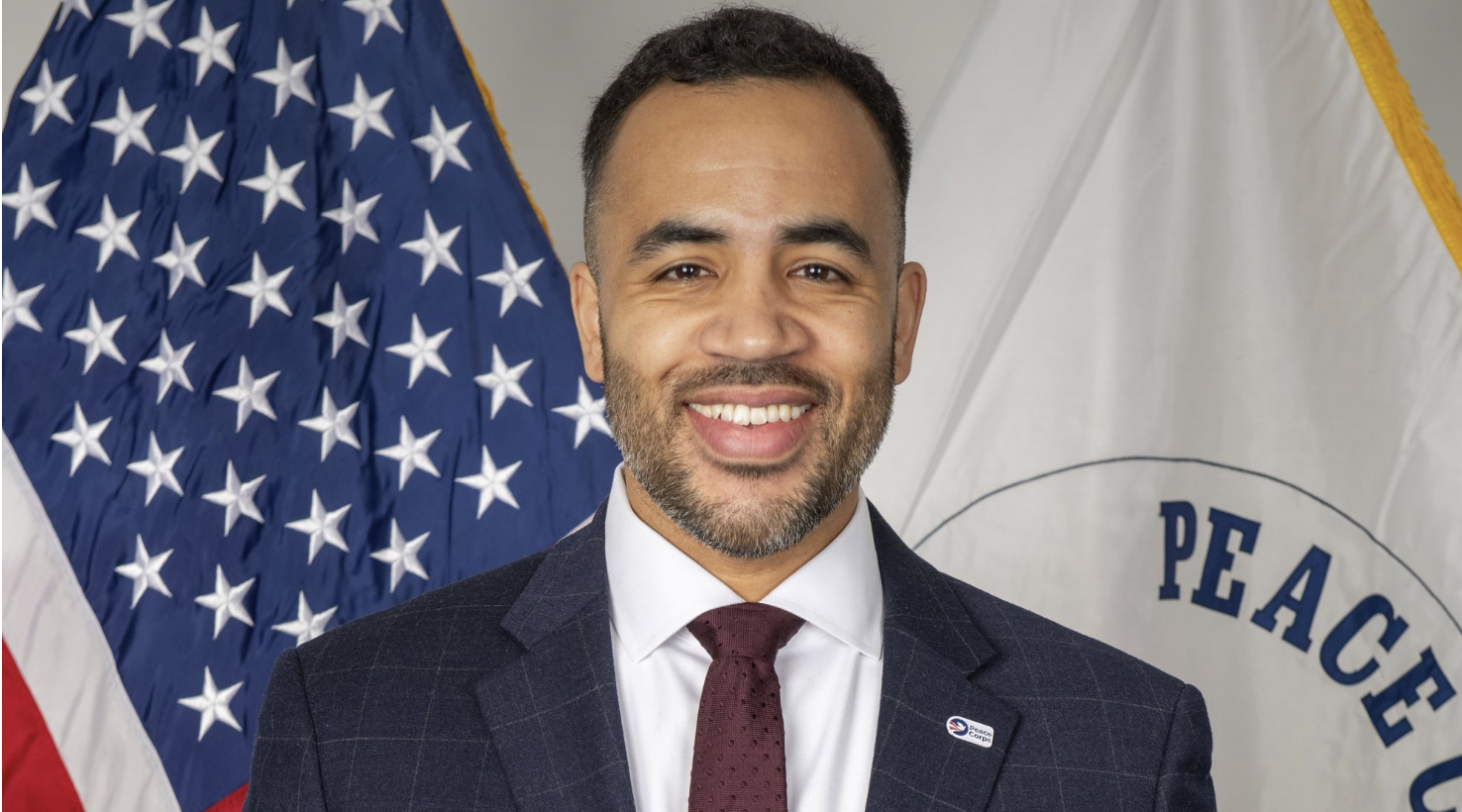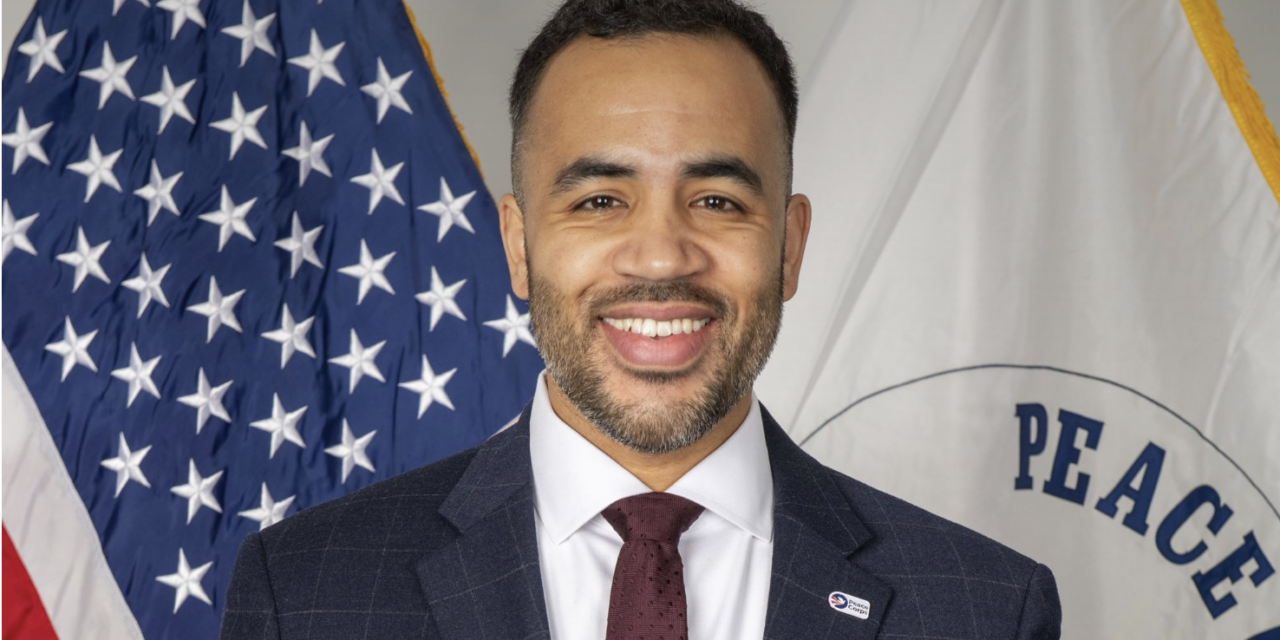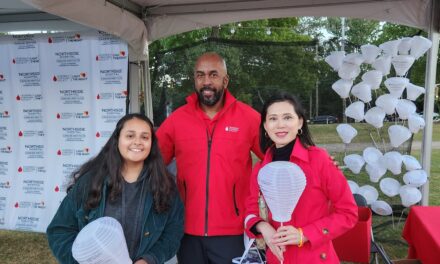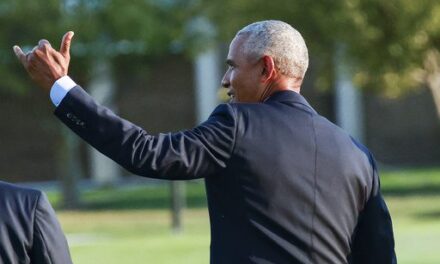
David E. White Jr. is the 14th Deputy Director of the Peace Corps, unanimously confirmed by the US Senate on December 20, 2023. White most recently served as Senior Advisor to the Deputy Secretary of State for Management and Resources at the US Department of State and as Special Assistant to the President in the White House Office of Presidential Personnel (PPO). Earlier in the Biden-Harris Administration, White served on the National Security Council as Senior Advisor to the White House Coordinator for Operation Allies Welcome, where he facilitated whole-of-government efforts to provide housing, health care, education, employment, and other resources for nearly 90,000 Afghan allies resettled in the United States. White began his career in public service as a cavalry officer in the U.S. Army. White is a graduate of the U.S. Military Academy at West Point and earned his law degree, cum laude, from Harvard Law School.
This first question is about your journey to becoming the Deputy Director. Can you share a key challenge in your journey to becoming Deputy Director and how your background shaped your ability to overcome this obstacle?
I’d start by telling you that I’ve always wanted to live a life of service, [which] for me was front and center as I was growing up. It’s an idea that really emanated [from] my family. As you may know, I’m a third-generation military veteran, so it’s always been about what [we can] do for our country. How can we give back to a country that’s given us so much?
That doesn’t mean that our country is perfect, but it means that our country has done great things and [has lifted] up all people. And so I want to be a part of serving others. And so for me, that meant going to West Point, joining the military as an Army officer, [and] leading soldiers in combat in Kandahar, Afghanistan. And I’ll tell you, that was a privilege of a lifetime. I absolutely loved that experience, and it was a formative experience for me that was also, however, kind of difficult.
I was on the war side then, and so after that experience, and after going to law school, and after having a little bit more experience [under] my belt, I’m particularly privileged to now be at the Peace Corps working on promoting world peace and friendship. Again, I want to emphasize that these two things go hand-in-hand. My experience—having come from where I saw conflict and strife and now being in a position where I get to work every day on promoting world peace and friendship—that is just so compelling for me.
It makes me feel great that I’m able to help so many people, and the Peace Corps has been doing this work for 63 years now, since 1961. [Now,] I can be the deputy director of an organization that has such a fantastic legacy but also a bright future. Now you also asked about the challenges. In a world with more strife and conflict, we need peace and friendship more. What I’m doing on a day-to-day basis [is] working with our country directors around the globe: we’ve got volunteers in 15 different time zones. We’re in 61 countries now around the world, so [I am] getting out there, visiting with the volunteers, supporting them, ensuring their health and safety, and making sure that they’re well-equipped to be able to drive our mission.
[Meanwhile], [we are] doing all this in a way that is not dictating to our partner nations how to do things or thinking that we have all of the answers, but rather listening first, listening empathetically to our partners and understanding the challenges [they] face and how [we] can support [these partners]—working side-by-side on locally prioritized development projects—to help solve those problems. I think that’s where the humility comes in, and I think [the] Peace Corps does a tremendous job of doing some of that work.
Our next question is going to be about the experience as a Black American in the international development space. As a Black American working in international development, what has surprised you the most about the development space, and how does that surprise impact the way you approach your work currently?
First and foremost, as Black Americans, we’ve got to take our seat at the table. When I talk about the table, that is in every domain: that’s in foreign policy, that’s in international development, that’s in domestic policy. Of course, and as people of color in general, we know that America is strongest because of its diversity, so we’ve gotta show up.
We [have to] ensure that our voices and perspectives are heard. There’s no better way than taking a seat at the table, actually jumping right into these arenas—so what does that look like? It looks like joining the Peace Corps, being a volunteer, [and] seeing some of this work firsthand. It looks like joining the Foreign Service. It looks like joining an administration, working at a department or agency, working at the White House. All of these things are incredibly important. So you can be well-versed in the issues impacting not only people here at home but also around the world.
As a Black American, I have [the] particular pride [that] I get to represent my country [on the] global stage and do it in a way that promotes world peace and friendship. I often tell people I mentor, [when] they often ask, “Well, how can I take my seat at the table?” It’s the same thing. You [have to] jump right in there. Director Carol Spahn, the Director of the Peace Corps, often says [that] life begins at the end of your comfort zone, running ahead of your comfort zone, getting uncomfortable, [and] being willing to take that leap.
That’s where we as a people, people of color, and all Americans can really make a difference: by taking a seat at the table and really representing our nation.
The next question here is about the future of international development. What trends do you see shaping the future of international development, and more specifically, how do you see the current geopolitical fragmentation that’s occurring impacting these shifts?
First, it comes back to [the] Peace Corps’ mission. We’ve been around since 1961, [which is] 63 years of promoting world peace and friendship. It started with an idea: how many Americans would be willing to serve, willing to leave home, go overseas, [and] work side-by-side with other people on these locally prioritized development projects? We found a resounding answer: yes, people are willing to do that.
In those 63 years, we’ve had over 240,000 volunteers serving in over 144 countries, and we’ve got over 3,000 volunteers serving right now in [61] countries. The reason why [the] Peace Corps has been so successful and will continue to be successful in this work of promoting world peace and friendship [is] because of our model: empathetically listening to the people we serve [and] [working] side-by-side on [our] shared development priorities. That really makes use of people-to-people diplomacy.
It’s not like volunteers join the Peace Corps and get thrown right into a community to start work. It starts with three months of pre-service training in [a] country where you’re learning a language, you’re learning the culture, the norms, the customs, and so forth. You’re getting trained by our local staff on the ground. If you’re a volunteer serving in Cameroon, Cameroon community members and Peace Corps employees are teaching you the language, the culture, the programmatic things that you need in order to be successful, and then after those three months of training, you continue to get support as you embark on two years in the field, working in remote communities on those locally prioritized developments. [The] Peace Corps’ model of building sustainable change and trust [among] countries, governments, and people around the world [is] built on this concept of human connection, and it all comes back to people-to-people diplomacy, this idea that people connecting allows us to promote world peace and friendship.
About the relevance and the evolution of the Peace Corps: Given the changes seen in global dynamics—whether that be the increased focus on low- and middle-income countries (LMICs) or the wave of far-right wing politics that we’ve seen throughout the world—how do you view the Peace Corps evolving and staying essential in international development today?
In a world full of conflict and strife, we need more peace and friendship. We have over a dozen countries who have requested Peace Corps volunteers, so demand is high, which speaks [to this] model of people-to-people diplomacy, grassroots development, and so forth. Even as things may oscillate from one pole to the next, we recognize that [the] Peace Corps is kind of this steady hum in the background representing a sustained commitment of the American people to different countries around the world.
I was just a couple [of] months ago in a meeting with an ambassador from one of our Central Asia[n] countries, and the ambassador requested 10,000 Peace Corps volunteers. I wish we had the funding to be able to support that many volunteers in that country, but that just speaks to the value of Peace Corps volunteers. Likewise, I was meeting recently with a country in Eastern Europe, and they said they wanted enough volunteers to be able to put a volunteer in every single public school in their country. Again, I wish we could do that. The point of the story, this anecdote, is really about how much value the international community places on Peace Corps volunteers, and that’s [an] extraordinarily strong legacy [of] those 63 years of promoting world peace and friendship.
It’s also because we recognize that we need to continue to evolve to meet the changing needs of the world. Let’s take, for example, the fact that we just had the COVID-19 global pandemic wipe out so much work on sustainable development goals. That’s in part why we’re recognizing there’s so much more to be done. There’s much more out there that countries need, and we are happy to answer that call.
It’s important to also know that [the] Peace Corps [works] side-by-side with folks in [each] local community around the world. That [work] begins with that community, that country, [and] the head of government requesting [that the] Peace Corps come[s]. We don’t invade. We accept an invitation to arrive, and then we stay for a long time. We’ve been in the African continent and other places for over 60 years now. [The] Peace Corps actually holds some of the longest and most durable relationships with many [countries].
Our next question here is about balancing moral imperatives and political realities. How do you navigate the tension between the moral imperatives of international development and the political realities that often influence decision-making in the field?
This is always going to be a tension, but [our] North Star when we’re looking at all [of] these competing interests [is] our mission, and our mission is to promote world peace and friendship. Now, that mission, of course, is hard to accomplish, right?
But we’re doing it day in [and] day out; like we talked about before, [we have] volunteers in 15 different time zones around the world [and] in 61 countries. If we focus on the communities that we serve and listen first to them on how we can best work side-by-side on those shared, locally prioritized development projects, that’s how we can keep moving in the right direction. That’s how we can follow our North Star, which is promoting peace and friendship.
Some of this means being able to fly above the phrase, so to speak: keep our eye on our mission and then continuously evolve. [For instance,] we’ve had a ton of interest in programming related to climate adaptation and resilienc[e]. We’ve been involved in [this] a long time, but we’ve been retooling a lot of our programmatic work to address those needs.
We recognize that it’s an existential crisis for many countries in the Pacific. We listen and we say, “How can we best support you and your development needs?” We’re hearing over and over again [about] rising tides [and] erosion: “We need help when it comes to climate resiliency and adaptation.” That’s why we’re so proud to partner with folks through things like the Blue Pacific Youth Initiative, which works with youth leaders and advocates in Pacific communities to take these challenges head-on. We recognize that [the] youth are the future.
Finally, what advice do you have for aspiring international development or Peace Corps-specific professionals or individuals who would like to volunteer? What advice would you give to a young professional wanting to enter the international development space and passionate about making a lasting impact?
I would tell them [to] get in the game. Consider the Peace Corps. It’s not a step away from your career. It’s a step into your career. People often think about the Peace Corps as this gap year thing: “Join the Peace Corps for a little bit, and [then] you go back to whatever you’re doing.” It’s not that at all.
It’s an experience that really changes your life. It’s an experience that can spark that love for public service, that influences a person in such [a way] that they want to continue to give back and have a lifetime of service. If you’re someone, whether it’s in Generation Z or older, and you think you want to serve in the Foreign Service, if you think you want to have a life dedicated to public service, [then the] Peace Corps is a fantastic first step in that journey.
The feeling you get [during] the work, from volunteering in these communities, [is] so important. It’s the locally prioritized development projects we work on together, but part of it [also] is just showing up and that people-to-people connection. One Peace Corps volunteer in a community is kind of like dropping a pebble in a pond. You see the ripples of that effect last generations; even if it’s not a particular workshop that a young person might have showed up [to] that a volunteer was hosting, it’s that informal people-to-people connection that can spark a real difference.
At [the] Peace Corps, we’re calling all Americans, including Gen Z, to turn their passion into meaningful, mission-driven service. And we know that folks can do that through the Peace Corps. If you want to be a diplomat, if you want to be an ambassador, if you want to be a member of Congress, then the Peace Corps is also a fantastic way to start your community, your opportunity, your journey down that path. For example, we look at ambassadors serving around the world. We know that Peace Corps volunteers are represented in the ranks [more] than folks from [any] other backgrounds. If you want to be a business CEO [or] run a business, we have Peace Corps volunteers who have done that. [The] Peace Corps can fit into your own journey, no matter what that path ends up looking like.
We want to make sure that all Americans, including Generation Z, are turning that passion into meaningful, mission-driven service, and we’d love for them to do it with the Peace Corps.
Dake spoke with White on October 4, 2024. This interview has been lightly edited for length and clarity.
The views expressed in this piece are the interviewee’s own and are not reflective of the views of the HIR.




